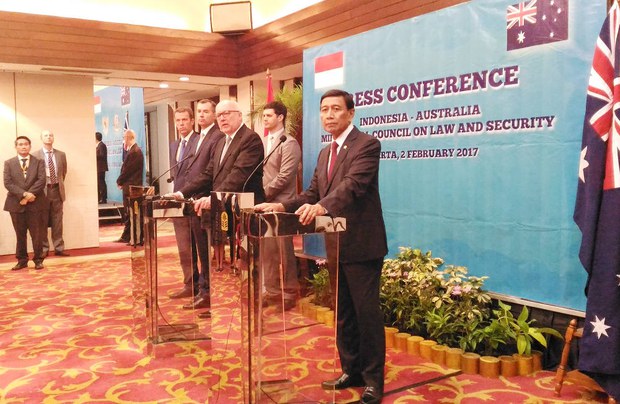Indonesia and Australia Discuss Ways to Stop Terrorism Funding
2017.02.02
Jakarta
 Wiranto, Indonesia’s coordinating minister for Political, Legal and Security Affairs (right), and Australian Attorney General George Brandis speak to reporters in Jakarta, Feb. 2, 2017.
Wiranto, Indonesia’s coordinating minister for Political, Legal and Security Affairs (right), and Australian Attorney General George Brandis speak to reporters in Jakarta, Feb. 2, 2017.
Indonesia and Australia pledged to cut off sources of funding for terror groups, a top Indonesian official said Thursday after meeting with his Australian counterpart in Jakarta.
The two sides discussed how Indonesian and Australia would work to curb the flow of money used to finance terrorism, Wiranto, Indonesia’s coordinating minister for Political, Legal and Security Affairs, told journalists after meeting with the delegation from Canberra, which was headed by Australian Attorney General George Brandis.
Wiranto said terrorism and a regional threat posed by Islamic State (IS) sympathizers and supporters exist because of the availability of funding from many sources.
“I don’t make any accusations, [but] I think in the current development, terrorism funding may flow from anywhere. With the existing technology, both countries have taken many steps to cut funding,” he said.
In August 2016, Indonesia and Australia co-hosted a meeting of 26 nations in Bali, at which delegations pledged to cooperate in strengthening intelligence efforts in cutting off funding sources, even as terrorists change their methods of delivering cash.
Cooperation is important in curbing the flow of terrorism funding, Brandis said.
“We know that one of the most effective ways to combat the surge of terrorism is to attack the funding and the movement of money,” Brandis said.
Meetings that began in December 2015 have significantly strengthened bilateral relations in law and security, he added.
Meanwhile, Indonesia’s Center for Financial Transaction Reporting and Analysis (PPATK) has revealed that funding from some sources in Australia assists radical networks in Indonesia. Funds have been sent to Indonesia 97 times through individuals and groups, according to PPATK.
About 88.5 billion rupiah (U.S. $6.6 million) has come from groups and individuals in Australia to terror group networks in Indonesia, the center also reported. Other countries linked to terror funding are Brunei Darussalam, Malaysia, the Philippines, Singapore, South Korea and Thailand.
Special team
Suhardi Alius, who heads Indonesia’s National Counter Terrorism Agency (BNPT), said his agency was part of a special team formed by PPATK to stem the flow of international terrorism funding.
“When a report comes, it would be verified first if it is from an individual, a group, or a foundation,” he said.
From January 2013 to November 2016, PPATK submitted 105 financial transactions allegedly linked to terrorism.
During the same period, the agency also received 267 suspicious transaction reported by financial service providers.
Last year, 25 suspicious transactions were detected – an increase of 12 cases from 2015, PPATK reported.
In 2014, the agency reported 26 suspicious transactions, while in 2013 there were 13 reported suspicious transactions and in 33 cases in 2012.
South China Sea
In addition to terrorism funding, both countries discussed their concerns about the South China Sea.
“We exchanged our views on the dynamics of security in the area and the importance of maintaining stability. We support all countries around the South China Sea to respect the international maritime law,” Wiranto said.
He emphasized that Indonesia is not a claimant state in territorial disputes over the sea has no overlapping border with other countries.
“We agree that whatever happens, as countries in the region, we should together maintain the regional stability,” Wiranto said. “Don’t let the South China Sea issue grow into [a] conflict between countries as it would disrupt the regional economy.”







